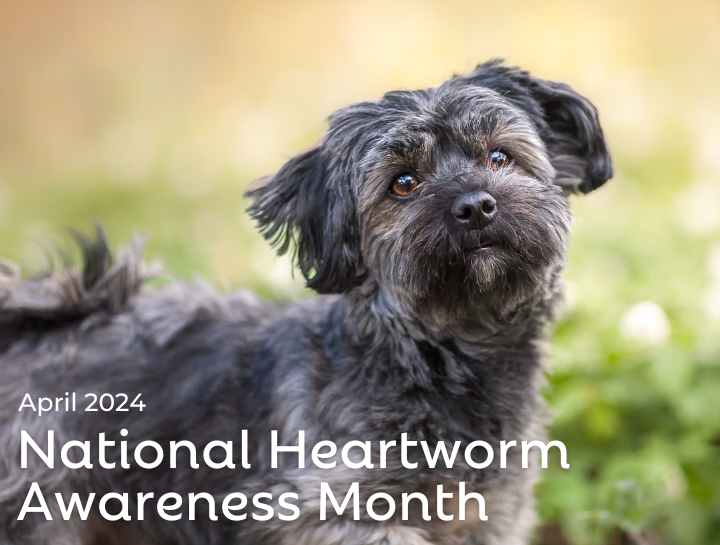Every April, pet owners across the United States come together to observe National Heartworm Awareness Month, a campaign dedicated to raising awareness about the dangers of heartworm disease in dogs and cats. This month-long initiative serves as a crucial reminder of the importance of preventive measures and regular screenings to protect our beloved pets from this potentially life-threatening condition.
National Heartworm Awareness Month
From https://centerforanimalhealth.com/

What is heartworm?
Heartworm disease is caused by a type of roundworm known as dirofilaria immitis. It takes 6 – 7 months for larvae to mature to adulthood where it begins the reproduction cycle. A single adult heartworm can reach up to 12 inches? in length and live up to seven years.
How do pets get heartworm?
Mosquitoes are the most common carrier of heartworm. A female mosquito picks up larvae in the bloodstream of an infected animal, then transmits the larvae into the next animal it bites. Dogs are a perfect host for heartworms which is why they’re most affected by the parasite, but cats can also become hosts. Mosquitos have been noted in studies to be active in freezing weather, not just in non-winter months
Heartworm larvae take about 4-5 months to develop into adult worms that settle into the organs of the animal. Once the worms take hold, the adults can live and produce larvae for 5-7 years.
Signs of heartworm in dogs
During the early stages of the infection, signs of heartworm is almost impossible to detect in dogs. Your dog will act normal until the larvae have matured a few months after infection. Signs of infection include:
- Coughing
- Easily fatigued
- Lethargic
- Lack of interest in play or exercise
- Decreased appetite
- Weight loss
As the infection advances, your dog may develop right-sided heart disease that results in a swollen belly from excess fluid that the heart can’t pump out. A dog that has a large quantity of heartworms in their organs can exhibit Caval Syndrome which is caused by the heartworms suddenly blocking blood flow.
Signs of heartworm in cats
Cats are much less likely to be afflicted by heartworms versus dogs, but it’s still a possibility. When a cat gets infected by heartworm, their organs are damaged just like in dogs. The condition, heartworm associated respiratory disease (HARD) can cause symptoms that include:
- Asthma-like attacks
- Loss of appetite
- Vomiting
- Seizures
- Difficulty walking
- Fluid accumulation
Heartworm prevention is important for cats because they can’t be treated after the worms have taken hold. Cats can live with heartworms, but they can also collapse or die when signs are first noticed.
How is heartworm tested?
Dogs can be treated starting at 7 months old and tested 6 months after their initial visit. Tests should be done every 12 months after the first two visits. Adult dogs who were never tested or treated for heartworm need to be tested prior to treatment. Afterwards, the dogs need to be tested six months after, then every 12 months.
Cats require a blood draw to look for antigens and antibodies in response to a heartworm infection. Because cats have no approved treatment for infection, they should be put on a preventative dose as soon as possible.
Engaging in heartworm prevention is one of the best ways to help pets stay healthy. Call (269) 663-3235 to talk to our team about heartworm prevention and treatment for your pets.
Discover more from ReviewFitHealth.com
Subscribe to get the latest posts sent to your email.